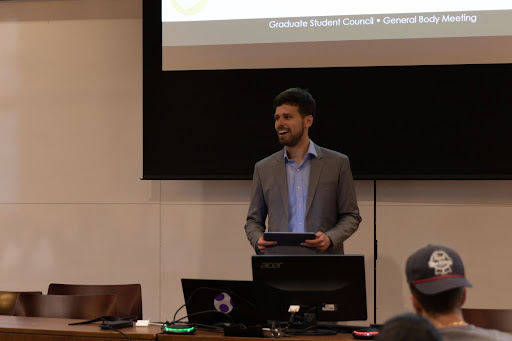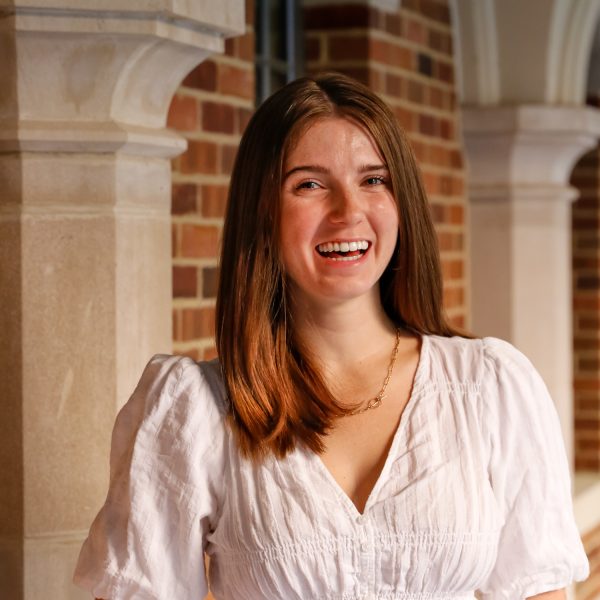The Graduate Student Council (GSC) held a town hall for election speeches on April 7 ahead of GSC Executive Board elections which took place from April 11-15. A total of 18 candidates ran for 14 available seats in the GSC.
2021-22 GSC Vice President and second-year graduate student Miguel Moravec ran unopposed for GSC President. Similarly, 2021-22 GSC Vice President of Community Affairs and second-year graduate student Kyra Smart ran unopposed for GSC Vice President.
At the town hall, each candidate was given the opportunity to make a brief speech about themselves, their platform, interest in the position and other relevant information for voters. Most candidates delivered speeches in person, while several did so via Zoom.
The positions available for election were president, vice president, two academic chairs, two community chairs, two social chairs, treasurer, secretary, public relations chair, Honor Council president and Honor Council vice president. President and vice president candidates ran unopposed, and the public relations chair will be decided post-election due to a lack of candidates.
For the special election process, a call for candidates for the public relations chair will be sent out to graduate students the week of April 18. Candidates will have the chance to introduce themselves at the next GSC general body meeting and an Anchor Link ballot will be sent out for voting.
Those that are able to vote include GSC executive board members and one department representative from each department. Voting proceeds in this manner to assure that each department gets equal voting power despite differing sizes between them.
2021-22 GSC President and fifth-year graduate student Joshua Passantino moderated the speeches, first explaining the format and then introducing each candidate. He expressed his delight with the number of students running for GSC elected positions and noted that several of the candidates had different views of how to run the GSC.
“There is not one single way to lead, and I know that all of the candidates will do what they believe is best for our students,” Passantino said. “I look forward to seeing what happens next year.”
During his speech, Moravec cited his experience on the GSC, specifically working with GSC department representatives to create resolutions, as the main motivator for his decision to run for president.
“As GSC President, I’ll leverage my experience calling for change on campus to make sure grad student needs are heard at the highest levels,” Moravec said.
Moravec’s campaign website lists his candidate platform, as well as a blog featuring involvement in student organizations, including his co-founding of student environmental activist group Dores Divest and graduate mentorship through the STEMSEAS program.
One practice Moravec said he hopes to bring to the GSC is transparency surrounding the GSC agenda. He also referenced Passantino’s work creating the graduate student lounge in Alumni Hall as motivation for some of his initiatives. Additionally, Moravec said he wants to “emphasize coalition building” in the GSC between graduate students, faculty and staff.
In their function as a student organization, GSC passes resolutions to advocate for initiatives that they want to address on campus, like the fossil fuel divest resolution passed in November 2020 and the endorsement of the Mental Health Bill of Rights in February 2019. Additionally, they promote and host events, including an end of the year celebration on Friday, April 29, for graduate students.
“I’d like to continue fostering a sense of belonging for graduate students on campus,” Moravec said.
As president, Moravec said he would work to encourage the GSC to address graduate student mental health. He cited an open letter written by graduate students in the Vanderbilt Biomedical Sciences Department as a catalyst for this issue, given that four graduate students in the department have committed suicide in the last two years, per the Tennessee Lookout. As of print, the letter has 117 signatures.
“The GSC has an incredible platform to consider and promote the changes these students are calling for, and under my presidency, the council would debate their proposals immediately,” Moravec said.
As of print, the university has not replied to The Hustler’s request for comment on the open letter or the mental health resources for graduate students.
At the town hall, Smart stated that her prior experience in GSC opened her eyes to the different ways that the council can aid the graduate student population.
“My ultimate motivation would be engaging those departments and groups who are currently underserved by the GSC, like remote workers who don’t go into a lab every day,” Smart said.
Smart said she hopes that any students who are interested in the GSC attend affiliated events and share their thoughts with the council. Additionally, she strives to follow in Moravec’s footsteps in the recruitment of department representatives for the GSC. Twenty new representatives joined GSC while Moravec was vice president, and Smart said she aims to increase this number during her term on GSC.
“I want to continue this work by taking what seems to me to be the next logical step: to create a space where department reps can speak in real time and organize directly by making a GSC Slack channel and encouraging engagement beyond our monthly meetings,” Smart said.
Like Moravec, Smart said she wants to focus on Vanderbilt’s marketing strategies to maintain its competitiveness to other elite institutions. She also hopes that the administration will be more willing to listen to GSC discussions about topics like increasing graduate student wages and health care coverage given the current nationwide inflation. Per Smart, this adjustment has been made at other schools, including Columbia University and Princeton University.







